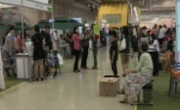During the Japanese colonial period, the colonial authorities tried to raise funds for the development of colonial cities in Joseon. The special levy and the special tax, which is a change thereof, provided a stepping stone for preparing such funds in...
http://chineseinput.net/에서 pinyin(병음)방식으로 중국어를 변환할 수 있습니다.
변환된 중국어를 복사하여 사용하시면 됩니다.
- 中文 을 입력하시려면 zhongwen을 입력하시고 space를누르시면됩니다.
- 北京 을 입력하시려면 beijing을 입력하시고 space를 누르시면 됩니다.

일제시기 대전지역의 토지평수할(土地坪數割) 실시와 자문·의결기관의 역할 = The implementation of income tax system per ‘Pyeong’(土地坪數割) and Role of advisory, legislative organization In Dae-jeon under the Japanese Colony
한글로보기https://www.riss.kr/link?id=A108731711
-
저자
천지명 (동국대학교 대외교류연구원)

- 발행기관
- 학술지명
- 권호사항
-
발행연도
2023
-
작성언어
Korean
-
주제어
The income tax system per ‘Pyeong’(土地坪數割) ; Local Finance ; Daejeon ; Myeon Council ; Eup Council ; Pu Council ; 토지평수할 ; 지방재정 ; 대전 ; 면협의회 ; 읍회 ; 부회
-
등재정보
KCI등재
-
자료형태
학술저널
-
수록면
257-297(41쪽)
- DOI식별코드
- 제공처
- 소장기관
-
0
상세조회 -
0
다운로드
부가정보
다국어 초록 (Multilingual Abstract)
During the Japanese colonial period, the colonial authorities tried to raise funds for the development of colonial cities in Joseon. The special levy and the special tax, which is a change thereof, provided a stepping stone for preparing such funds in local operations. Under Japan’s Urban Planning Act, the ‘beneficiary charge’ which had been assigned on the beneficiaries of the project, was imposed on various civil engineering-related projects in the name of ‘The income tax system per ‘Pyeong’(土地坪數割)’.
‘The income tax system per ‘Pyeong’(土地坪數割)’‘, imposition of tax items that had not been verified for fairness and equity, had been started in Dae-jeon area without any questioning of the advisory organization.
In Dae-gu and Bu-san, the issue of imposition became controversial and the burden on the residents was adjusted through consultation with the authorities. However, local residents’ petition and the official complaints of local councillor had been ignored in Dae-jeon. Because many of the members in local assembly are occupied by people who cooperated with the authorities’ development projects as civil engineer or people involved in city planning.
The income tax system per ‘Pyeong’(土地坪數割) in Dae-jeon was changed to ‘the Road Beneficiary Charges Collection Regulations’ following the promulgation of the Joseon Road Ordinance in September 1941. The Japanese Government General of Korea had tried to impede role of subcommittee as a legislative organ. However, the Dae-jeon department which had voting right on the subjects confirmed and approved the original plan, pointing out the impact on the interests of the residents in the situation of declaring a beneficial Pu Council in March 1941.
국문 초록 (Abstract)
일제시기 식민 당국은 조선의 식민도시 개발 재원을 현지에서 마련하고자 하였다. 특별부과금과 이의 변경인 특별세는 지방 운영에 있어서 그러한 재원마련의 발판이 되었다. 일본의 도시...
일제시기 식민 당국은 조선의 식민도시 개발 재원을 현지에서 마련하고자 하였다. 특별부과금과 이의 변경인 특별세는 지방 운영에 있어서 그러한 재원마련의 발판이 되었다. 일본의 도시계획법 하에서 사업 수익자에게 부담되었던 ‘수익자부담’은 ‘토지평수할’이라는 명목으로 이를 채택한 지역의 각종 토목 관련 사업에 부과되었다.
1929년부터 토지평수할을 도입, 부과하기 시작한 대전 지역은 자문기관의 아무런 문제제기 없이 이 공정성이나 형평성이 확인되지 않은 세목(稅目)이 실시되기에 이르렀다. 대구나 부산 지역에서는 해당 부과 문제가 논란이 되어 일정 부분 당국과 협의를 통해 부민의 부담이 조정되기도 하였다. 그러나 대전의 경우 읍회 시기나 부회 시기 모두 지역의 진정이나 일부 의원들의 문제제기가 묵살되었다. 이는 의원 구성원 안에 면시기부터 토목계 인물들이나 도시계획에 직접 참여한 인물들이 포진하면서 당국의 개발 사업에 비교적 협조적인 태도를 보이는 인물들이 많았기 때문으로 보인다.
대전지역 토지평수할은 조선도로령에 근거하여 1941년 9월 '도로수익자부담금징수규정'으로 변경되었다. 총독부는 동 규정을 인가하는 과정에서 해당 규정의 설정을 의결 사안이 아닌 자문사안으로 변경할 정도로 부회의 의견을 차단을 하고자 하였다. 그러나 논의 당시 해당 문제에 대한 의결권을 가졌던 대전부회는 동 3월 전시체제에 부응하기 위한 익찬부회(翼贊府會)를 선언한 상황에서 부민의 이해관계에 영향을 지적하면서도 원안을 확정, 가결하였다.
동일학술지(권/호) 다른 논문
-
골튼(F. Galton)의 정상(normality) 개념과 우생학(eugenics) 그리고 성(性)
- 동국대학교 동국역사문화연구소
- 김호연
- 2023
- KCI등재
-
노예무역과 노예제도의 글로벌-빅히스토리; 오하이오강과 미시시피강의 수계를 중심으로
- 동국대학교 동국역사문화연구소
- 양홍석
- 2023
- KCI등재
-
- 동국대학교 동국역사문화연구소
- 金子修一
- 2023
- KCI등재
-
- 동국대학교 동국역사문화연구소
- 하야시 미키
- 2023
- KCI등재




 KCI
KCI 스콜라
스콜라







